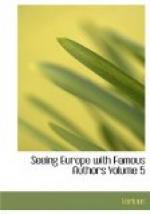All is gaiety and good humor. You return again to the foot-promenade, and look sharply about you, as you move onward, to catch the spark of beauty, or admire the costume of taste, or confess the power of expression. It is an Albanian female who walks yonder, wondering, and asking questions, at every thing she sees. The proud Jewess, supported by her husband and father, moves in another direction. She is covered with brocade and flaunting ribbons; but she is abstracted from everything around her, because her eyes are cast downward upon her stomacher, or sideways to obtain a glimpse of what may be called her spangled epaulettes. Her eye is large and dark; her nose is aquiline; her complexion is of an olive brown; her stature is majestic, her dress is gorgeous, her gait is measured—and her demeanor is grave and composed. “She must be very rich,” you say—as she passes on. “She is prodigiously rich,” replies the friend, to whom you put the question—for seven virgins, with nosegays of choicest flowers, held up her bridal train; and the like number of youths, with silver-hilted swords, and robes of ermine and satin, graced the same bridal ceremony. Her father thinks he can never do enough for her; and her husband, that he can never love her sufficiently.
Whether she be happy or not, in consequence, we have no time to stop to inquire, for see yonder! Three “turbaned Turks” make their advances. How gaily, how magnificently they are attired! What finely proportioned limbs—what beautifully formed features! They have been carousing, peradventure, with some young Greeks—who have just saluted them, en passant—at the famous coffee-house before mentioned. Everything around you is novel and striking; while the verdure of the trees and lawns is yet fresh, and the sun does not seem yet disposed to sink below the horizon. The carriages still move on, and return, in measured procession. Those who are within, look earnestly from the windows, to catch a glance of their passing friends. The fair hand is waved here; the curiously-painted fan is shaken there; and the repeated nod is seen in almost every other passing landaulet. Not a heart seems sad; not a brow appears to be clouded with care.
Such—or something like the foregoing—is the scene which usually passes on a Sunday evening—perhaps six months out of the twelve—upon the famous Prater at Vienna; while the tolling bell of St. Stephen’s tower, about nine o’clock—and the groups of visitors hurrying back, to get home before the gates of the city are shut against them—usually conclude the scene just described.
[Footnote A: From “A Bibliographical, Antiquarian and Picturesque Tour.” published in 1821.]
[Footnote B: Marie Louise, second wife of Napoleon, and their son, the King of Rome.]
VI
HUNGARY




